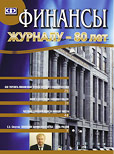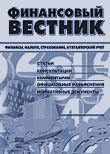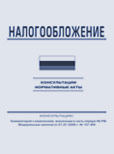Содержание
Финансы и бюджет: проблемы и решения
К.В. Вышковский, директор Департамента государственного долга и государственных финансовых активов Минфина России
E-mail: finance-journal@mail.ru
В интервью журналу «Финансы» К.В. Вышковский высказал свое мнение о влиянии на долговую политику России неблагоприятных внешних и внутренних факторов, о справедливости оценок международных рейтинговых агентств, о внешних долгах крупнейших российских компаний, об объемах госдолга субъектов Российской Федерации.
Ключевые слова: долговая политика, внешний долг, суверенный рейтинг, облигационные займы, корпоративная задолженность, внешний рынок капитала, финансовый рынок.
Налоги: теория и практика
Н.В. Пономарёва, декан факультета «Международная школа бизнеса» РЭУ им. Г. В. Плеханова, профессор кафедры «Налоги и налогообложения», кандидат экономических наук, доцент
В.А. Пыркин, ассистент кафедры «Налоги и налогообложение» РЭУ им. Г.В. Плеханова
E-mail: nvponomareva@rea.ru
Авторы пишут о законодательных мерах, которые помогли бы деофшоризации российской экономики, раскрывают приемы, к которым прибегают «фирмы-однодневки» и «организации-транзитеры». Они пишут также о повышении эффективности налоговых проверок как способе увеличить наполняемость бюджета.
Ключевые слова: налоговые поступления, дефицит бюджета, раскрытие информации, последовательное владение.
Х.М. Мусаева, профессор кафедры «Налоги и денежное обращение», кандидат экономических наук, Дагестанский государственный университет
E-mail: Xaibat27@rambler.ru
Обосновывается необходимость рассмотрения налоговой льготы не только как инструмента регулирования экономики, но и как элемента социальной политики государства. Ключевой и до сих пор нерешенный вопрос – это обоснование льгот. Автор говорит о злоупотреблениях в исследуемой им области, нецелевом использовании уже предоставленных льгот, которые приводят к существенным прямым потерям бюджета. Он приводит данные об аномально низком отношении налоговых поступлений в Дагестане к ВРП.
Ключевые слова: налоговая льгота, дефиниция, преференции, вычеты, показатели, налоговый паспорт региона.
С.В. Разгулин, действительный государственный советник РФ 3 класса
E-mail: minfin608@rambler.ru
Автор приводит аргументы в пользу того, чтобы главным направлением в развитии законодательства о налогах и сборах в части налогового контроля за банками становилось не введение нового вида контроля и не его ужесточение, а уточнение возлагаемых на банки обязательств, а также составов правонарушений за их неисполнение. Ряд нормативных актов утратил актуальность, следовательно, и корреспондирующая ответственность должна быть отменена, что будет способствовать снижению административной нагрузки на налогоплательщиков и банки, высвобождению ресурсов налоговых органов на выявление иных правонарушений.
Ключевые слова: обязательство, отчетность, представление сведений, избыточный контроль, банковская гарантия.
Страхование
М.В. Моисеенко, преподаватель Нижегородского государственного университета им. Н.И.Лобачевского
E-mail: Rsa-pfo@yandex.ru
Автор прослеживает историю учреждения в России надзора над страховой деятельностью, описывает задачи, функции и персональный состав Страхового Комитета, действовавшего под эгидой Министерства финансов и Министерства внутренних дел. Надзор в царской России осуществлялся на высоком профессиональном уровне, а расходы на содержание Комитета несли сами страховщики и тогдашние ОВС.
Ключевые слова: страховые общества, финансовая и статистическая отчетность, уставный капитал.
Крис Баррет, страховой аналитик и риск-менеджер, руководитель страховой практики PricewaterhouseCoopers в России в 2009-2011 гг.
E-mail: Finance-journal@mail.ru
Автор анализирует показатели и критерии, по которым можно оценивать конкурентоспособность страховых компаний, в частности России, особенности андеррайтинга и претензионной работы, стратегии перестрахования, разрабатываемой для каждой новой фазы развития прямого страховщика. Он пишет об опасностях, которыми чреват ценовой демпинг, а также о причинах низкой капитализации российского страхового рынка.
Ключевые слова: конкурентные преимущества, аквизиционные расходы, расходы на ведение дела, выплаты, пропорциональное и квотное перестрахование, инвестиционная деятельность, рейтинги.
E-mail: finvestnik@mail.ru
В материале Э.С. Гребенщикова кратко анализируются основные тенденции и показатели развития страхового рынка, которые можно в целом считать довольно позитивными и благоприятными для страховщиков. Произошло, правда, некоторое снижение отраслевой динамики, в основном из-за ухудшения макроэкономической конъюнктуры. Сокращение числа страховых организаций оказалось далеко не таким драматичным, опровергая делавшиеся ранее алармистские прогнозы на этот счет. Освещается также положение в таких секторах, как ОМС, Зеленая карта, ОСОПО.
Ключевые слова: премии, коэффициент убыточности, реестр, субъекты страхового дела.
Мнения
В.Л. Макаров, академик РАН, директор ЦЭМИ РАН
М.Р. Пинская, профессор Финансового университета, доктор экономических наук
E-mail: MPinskaya@yandex.ru
Р.В.Фаттахов, профессор Финансового университета, доктор экономических наук
В материале затрагиваются две темы: сущность общественных (публичных) благ, оценка их объема, стоимости и качества, во-первых, и структура будущего сетевого учебника, посвященного финансам в целом, во-вторых. Раскрывается концепция учебника по финансам в электронном виде, построенного на использовании сетевой технологии. Отмечается также вклад выдающихся зарубежных ученых в разработку научных основ теории публичных финансов, которая займет центральное место в коллективном труде Финансового университета.
Ключевые слова: общественные финансы, ссылки и источники, сетевой учебник, учебный процесс.
Финансовый контроль и аудит
Ю.М. Воронин, профессор Финансового университета при Правительстве РФ, доктор экономических наук
E-mail: yuri.voronin@gmail.com
Более чем двадцатилетняя практика российского реформирования показывает, что экономика несет значительные потери из-за отсутствия в стране слаженной, четко функционирующей единой системы государственного финансового контроля. Опыт развитых стран свидетельствует, что эффективный финансовый контроль является необходимым условием существования сильного демократического государства и важным фактором государственного строительства.
Между тем до настоящего времени еще не нашли общего одобрения концептуальные подходы формирования в стране единой системы государственного (муниципального) финансового контроля. Это, в свою очередь, не дает возможности решить проблему четкого правового обеспечения функционирования такой системы.
Ключевые слова: финансовый контроль, внутренний контроль, внешний контроль.
Финансы социальной сферы
А.К. Соловьев, профессор Финансового университета при Правительстве РФ, доктор экономических наук
E-mail: Leykova@100.pfr.ru
Приближение срока реализации в 2015 г. ключевого комплекса мероприятий пенсионной реформы, намеченных правительственной Стратегией долгосрочного развития пенсионной системы Российской Федерации, обострило интерес не только научной общественности, но и практиков к условиям и, главное, к экономическим результатам намеченных преобразований. Макроэкономические факторы – резкое падение темпов роста экономики, увеличение инфляции, снижение темпов роста зарплаты и, соответственно, уровня жизни всего населения – создали дополнительные риски достижения целевых ориентиров пенсионной реформы. В статье анализируются и соизмеряются долгосрочные целевые ориентиры и комплекс мероприятий, направленных на их достижение.
Ключевые слова: пенсионная реформа, трудовая пенсия, прожиточный минимум пенсионера, страховая часть трудовой пенсии, накопительная часть трудовой пенсии.
На вопросы читателей отвечают специалисты Пенсионного фонда РФ
Корпоративные финансы
Е.Б. Тютюкина, доктор экономических наук, профессор, заведующая кафедрой «Инвестиции и инновации», ФГОБУ ВПО «Финансовый университет при Правительстве Российской Федерации»
E-mail: etutukina@mail.ru
Т.Н. Седаш, кандидат экономических наук, доцент кафедры «Инвестиции и инновации», ФГОБУ ВПО «Финансовый университет при Правительстве Российской Федерации»
E-mail: t_sedash@mail.ru
В статье проведен анализ финансовой отчетности 87 крупнейших российских компаний, работающих в 24 отраслях экономики, и выявлены основные причины, сдерживающие финансовое обеспечение инвестиционной и инновационной деятельности российских компаний. Определено влияние недостаточности внутренних источников финансирования, ограниченной возможности привлечения заемных источников финансирования, слабой развитости фондового рынка на инвестиционные возможности компаний отраслей реального сектора экономики.
Статья подготовлена по результатам исследований, выполненных за счет бюджетных средств по государственному заданию для Финансового университета в 2013 г.
Ключевые слова: инвестиционная деятельность, финансовое обеспечение, источники финансирования.
Из истории финансов
C.А. Болотов, кандидат экономических наук
Тел. +7 (495) 756-45-33
Производство и продажа алкоголя давно привлекли к себе внимание казны как к весомому источнику государственных доходов. Пошлины с виноторговли уплачивались более аккуратно по сравнению с другими видами товаров. Власть строго контролировала участников процесса. Автор рассказывает, как на протяжении XVII-XX вв. совершенствовались виноторговля и её налогообложение в России. В конечном счёте и для государства, и для потребителей наиболее выгодной и разумной оказалась общественная продажа вида без участия многочисленных посредников. Накопленный опыт был широко использован в XIX–XX вв. в создании и развитии потребительской кооперации.
Ключевые слова: откупа, казенная монополия, общественная продажа вина.
Научные исследования аспирантов и соискателей
А.А. Журавлева, аспирант кафедры налоговой политики и налогообложения Государственного университета управления
E-mail: AnAZhuravleva@rosatom.ru
Вывод капиталов в офшоры и низконалоговые юрисдикции – довольно распространенная операция, проводимая корпорациями и холдингах в рамках ведения своей деятельности. Автор оценивает возможности для минимизации ее масштабов. Он предлагает уточнить правовые категории «бенефициарный собственник» и «контролируемая иностранная компания», опираясь на принятую за рубежом трактовку.
Ключевые слова: бенефициарный собственник, офшорная юрисдикция, контролируемая иностранная компания, вывод средств за рубеж.
Г.С. Копыченко, аспирант Финансового университета при Правительстве РФ
E-mail: finance-journal@mail.ru
Повышение конкурентоспособности муниципальных образований требует выстраивания эффективной системы целевого планирования социально-экономического развития муниципалитетов. В силу принятых в 2013 г. поправок в Бюджетный кодекс РФ муниципальные программы должны стать основным инструментом целевого развития муниципальных образований. В статье дается анализ связи программного бюджета с формированием конкурентоспособности муниципальных образований, повышением устойчивости их социально-экономического развития, а также качество муниципальных программ.
Ключевые слова: конкурентоспособность муниципальных образований, программный бюджет, расходование бюджетных средств.
Информация
В материале дан краткий обзор высказываний министра финансов России А.Г. Силуанова на Петербургском международном экономическом форуме 23 мая 2014 г.
E-mail: finance-journal@mail.ru
Информация о научно-практической конференции на тему «Государственный (муниципальный) финансовый контроль в Российской Федерации. Теория, практика, перспектива развития».
А.А. Михайлова, начальник отдела Института реформирования общественных финансов, кандидат экономических наук
E-mail: finance-journal@mail.ru
13 мая 2014 г. Институт реформирования общественных финансов провел представительный круглый стол на тему «Бюджетные основы государственного управления». В его работе приняли участие представители федеральных и региональных органов государственной власти, руководители подразделений других финансовых и экономических органов регионов и муниципалитетов, представители научных организаций и бизнес-сообщества.
Annotation
K.V. Vishkovsky, director of Department of state debt and state financial assets of the Ministry of Finance of Russia.
E-mail: finance-journal@mail.ru
In an interview to “Finance” journal K.V. Vishkovsky expressed his opinion about the impact of unfavorable external and internal factors on debt policy of Russia, fairness of assessments of international rating agencies, external debt of the largest Russian companies, amount of state debt of subjects of the Russian Federation.
Keywords: debt policy, external debt, sovereign ratings, bonded debt, corporate debt, external capital market, financial market.
N.V. Ponomareva, dean of faculty “International school of business” of the Plekhanov Russian University of Economics, professor of chair “Tax and taxation”, candidate of economic sciences, associate professor
V.A. Pirkyn, assistant of chair “Tax and taxation” of the Plekhanov Russian University of Economics.
E-mail: nvponomareva@rea.ru
Authors write about legislative measures that would help the de-offshorisation of the Russian economy, reveal the methods used by “short - lived companies” and “transit - organizations”. They also write about increasing the effectiveness of tax audits as a way to increase filling of the budget.
Keywords: tax revenues, budget deficit, information disclosure, consistent possession.
H.M. Musaeva, professor of chair “Tax and monetary circulation”, candidate of economic sciences, Dagestan State University
E-mail: Xaibat27@rambler.ru
Necessity of consideration of tax benefit not only as a tool of economic regulation but as an element of social policy of the state is substantiated. Key and still unresolved question is the substantiation of benefits. Author tells about abuses in the area under study, misuse of provided benefits which cause significant direct budget losses. Data about abnormally low ratio of tax revenues in Dagestan to GRP is provided.
Keywords: tax benefit, definition, preferences, deductions, indicators, tax passport of the region.
S.V. Razgulin, full state adviser of the Russian Federation of the 3rd class
E-mail: minfin608@rambler.ru
Author cites arguments in favor of the fact that the main direction in development of legislation on taxes and tax collection in the part of tax control over the banks was not the introduction of new types of control and tightening but specification of liabilities assigned to the banks, and also components of offences for non - fulfillment of liabilities. A number of regulations lost their relevance, therefore corresponding responsibility should be cancelled that will contribute to reduction of administrative burden on taxpayers and banks, releasing the recourses of tax bodies for detecting other offenses.
Keywords: obligation, accountability, representation of information, redundant control, bank guarantee.
M.V. Moiseenko, lecturer of the Lobachevsky State University of Nizhni Novgorod
E-mail: Rsa-pfo@yandex.ru
Author traces the history of establishment of supervision over insurance activities in Russia, describes the tasks, functions and structure of Insurance Committee operating under the aegis of the Ministry of Finances and Ministry of Internal Affairs. Supervision in Russia prior to 1917 was carried out at a high professional level and costs of maintenance of Committee were incurred by the insurers themselves and Societies of Mutual Insurance.
Keywords: insurance companies, financial and statistical reporting, authorized capital.
Chris Barrett, prominent insurance analyst and risk manager, head of insurance practice of PricewaterhouseCoopers in Russia in 2009 – 2011
E-mail: Finance-journal@mail.ru
A strong insurance sector can contribute to the health of the overall economy in different ways. Most obviously strong insurers are needed to carry the risks of other businesses and the wider public. Insurance buyers should therefore be allowed the opportunity to distinguish between strong and less strong insurance companies, also by the way of peer analysis. Successful insurers are also a vital source of long-term investment.
The author analyses the indicators and criteria by which competitiveness of insurance companies can be assessed, in particular in Russia, features of underwriting and claims settlement work, reinsurance strategies developed for each new phase of development of the direct insurer. He writes about perils of price dumping and also explains the reasons of low capitalization of Russian insurance market.
Keywords: competitive advantages, acquisition costs, costs of doing business, payments, proportional and quota share reinsurance, investment activities, ratings.
E-mail: finvestnik@mail.ru
Dr Eduard Grebenshchikov reviews statistical results and trends of the development of the insurance industry in recent years and in the first quarter of 2014. Statistical tables reveal slowdown in the growth of premium income but dynamics remain positive, loss ratio even diminished in MTPL. Some players were forced to leave the market, but their number was limited, positions of top 10 insurers remained strong. Some diminished their involvement in MTPL, but some increased it. Green card in Russia marked its 5-th year, the performance in this sector is presented in the article as well.
Keywords: premium, loss ratio, register, subjects of insurance business, licenses revoked.
V.L. Makarov, academic of RAS, director of CEMI of RAS
M.R. Pinskaya, professor of the Financial University, doctor of economic sciences
E-mail: MPinskaya@yandex.ru
R.V. Fattahov, professor of the Financial University, doctor of economic sciences
Material considers two topics: firstly essence of public goods, assessment of its volume, cost and quality, secondly structure of future network textbook devoted to finance as a branch of science. Concept of the textbook on Finance in electronic form based on use of network technologies is being elaborated by group of scientists. Also the article praises the contribution of outstanding foreign academicians to the promotion and development of the theory of public finance.
Keywords: public finance, references and sources, network textbook, educational process.
Y.M. Voronin, professor of the Financial University under the government of the Russian Federation, doctor of economic sciences
E-mail: yuri.voronin@gmail.com
More than twenty – years practice of the Russian reformation shows that economy incurs considerable losses due to the lack in the country of coordinated, well - functioning uniform system of the state financial control. Experience of developed countries shows that effective financial control is a necessary condition for the existence of strong democratic state and important factor of state building.
Meanwhile, so far conceptual approaches of formation in the country of uniform system of state (municipal) financial control didn’t find general approval. It doesn’t give an opportunity to solve the problem of clear legal support of functioning of this system.
Keywords: financial control, internal control, external control.
A.K. Solovyev, professor of the Financial University under the government of the Russian Federation, doctor of economic sciences
E-mail: Leykova@100.pfr.ru
Approaching of the date of realization in 2015 of the key complex measures of pension reform planned by the government Strategy of long – term development of the pension system of the Russian Federation have heightened the interest not only of scientific community but also of practitioners to conditions and importantly economic results of planned reforms. Macroeconomic factors – sharp drop of rates of economic growth, increase of inflation, decrease of rates of growth of salary and consequently standard of living of entire population – created additional risks of achievement of targets of pension reform. Article analyzes and estimates long – term targets and complex of measures aimed at their achievement.
Keywords: pension reform, labor pension, living – wage of pensioner, insurance part of labor pension, funded part of labor pension.
Questions of readers are answered by the specialists of the Pension Fund of the Russian Federation.
E.B. Tutukina, Doctor of Economics, Professor, Chair of Department «Investments and Innovation», Finance University under the Government of the Russian Federation
E-mail: etutukina@mail.ru
T.N. Sedash, Candidate of Economics, Associate Professor, Department of Investments and Innovation, Finance University under the Government of the Russian Federation
E-mail: t_sedash@mail.ru
The article analyzes the financial statements of 87 of the largest Russian companies operating in 24 sectors of the economy, and identifies the main reasons that constrain financial support investment and innovation activities of Russian companies. The effect of the failure of domestic funding sources, limited ability to attract borrowed funds, underdeveloped stock market on investment opportunities in companies of basic industries is identified.
Keywords: investment attractiveness, financing, sources of investment.
A.N. Zoubets, head of Center of strategic researches of company "Rosgosstrah", head of Department of Sociology of the Financial University under the Government of the Russian Federation
E-mail: alexei_zoubets@rgs.ru
A.S. Sazanakova, specialist of Center of strategic researches of company "Rosgosstrah"
Middle class in the conditions of market economy is a guarantee of social stability of the state. Its’ main feature is the ability to satisfy all basic family requirements by its own labor without help of the state. Article analyzes the data of sociological researches based on several approaches – on the basis of level of material well being (taking into account living standards and level of consumption), resource approach (volume, type and structure of capital owned by a person) and subjective approach i.e. on the basis of self – identification of the population.
Keywords: middle class, housing, savings, ability to buy a new car.
S.A. Bolotov, candidate of economic sciences
Тел. +7 (495) 756-45-33
Production and sale of alcohol long ago attracted the attention of Treasury as a significant source of government revenues. Customs from wine trade were paid more carefully in comparison with other types of goods. Government strictly controlled participants of the process. Author tells how wine trade and its taxation were improved in Russia during XVII – XIX. Ultimately both for the state and for consumers sale of wine without participation of numerous intermediaries was the most advantageously and reasonable. Accumulated experience was widely used in XVII – XIX in creation and development of consumer cooperation.
Keywords: farming, state monopoly, public sale of wine.
A.A. Zhuravleva, post – graduate student of chair of Tax policy and taxation of the State University of Management
E-mail: AnAZhuravleva@rosatom.ru
Output of capital into the offshore and low – tax jurisdictions is a fairly common operation conducted by corporations and holdings within the frameworks of their activities. Author evaluates opportunities for minimizations of its scale and proposes to clarify legal categories “beneficial owner” and “controlled foreign company” based on the accepted abroad interpretation.
Keywords: beneficial owner, offshore jurisdiction, controlled foreign company, withdraw of funds abroad.
G.S. Kopychenko, post – graduate student of the Financial University under the Government of the Russian Federation
E-mail: finance-journal@mail.ru
Increase of the competitiveness of municipal establishments requires building the effective system of target planning of socio – economic development of municipalities. On the strength of amendments to the Budget Code of the Russian Federation adopted in 2013 municipal programs should become the main tool of target development of municipal establishments. Article gives the analysis of connection of program budget with formation of competitiveness of municipal establishments, increase of sustainability of their socio – economic development and also quality of municipal programs.
Keywords: competitiveness of municipalities, program budget, expenditure of budget funds.
Material gives a brief review of the statements of the Minister of Finance of Russia A.G. Siluanov at the St. Petersburg International Economic Forum on 23rd May 2014.
E-mail: finance-journal@mail.ru
Information about scientific – practical conference on the theme “State (municipal) financial control in the Russian Federation. Theory, practice, prospects of development”.
A.A. Mikhailova, head of department of the Institute for Public Finance Reform, candidate of economic sciences.
E-mail: finance-journal@mail.ru
On 13th May 2014 Institute for Public Finance Reform held representative round table on the theme “Budget fundamentals of public administration”. In its work took part representatives of Federal and regional bodies of public authorities, heads of departments of other financial and economic bodies of regions and municipalities, representatives of scientific organizations and business community.
E-mail: finance-journal@mail.ru
Specialists of the company “Deloitte” shared their observations on the process happening on the market of banking services. Credit organizations try to compensate reduction of incomes from principal activities at the expense of commission charges. Consultants also told about new methods of fraud – fighting by means of forensic - accounting (forensic) examination. For these purposes corporations that became target of fraudsters in increasing frequency involve external experts. Fight against fraud is carried out with varying success. Sharply increased cost of services of encashment of shadow incomes is caused by effective measures taken in this field by Ministry of Finance and law enforcement agencies.
Keywords: commission incomes, fraud by staff, technical companies, business solution, compliance.











